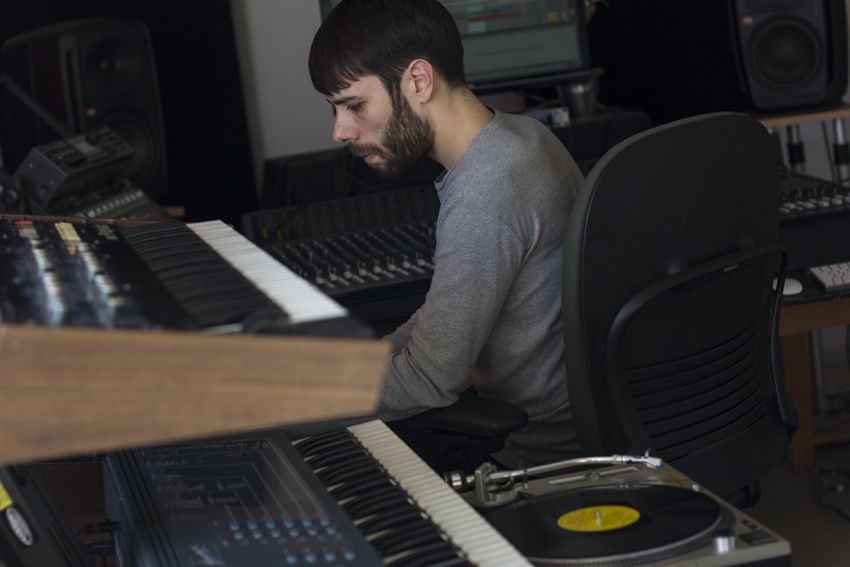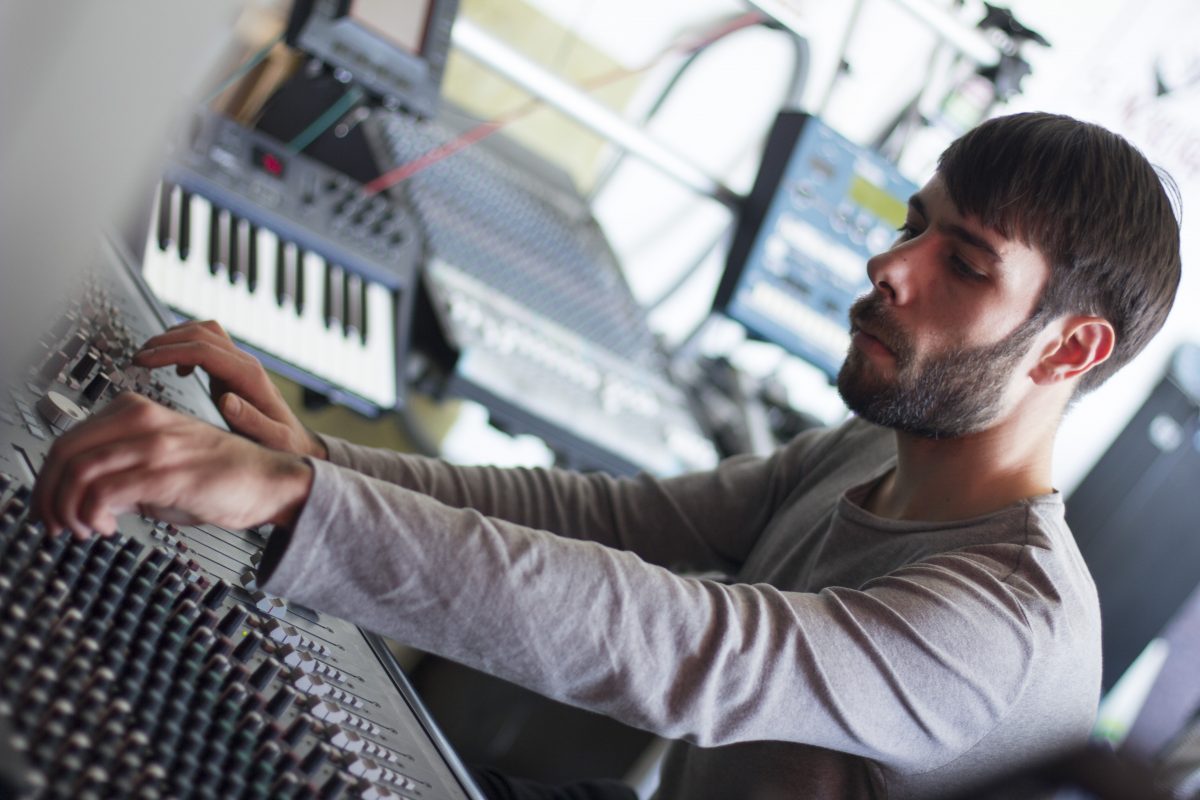Artist Tips: Slow Life
Wise words from the Spanish-Italian collective.

Artist Tips: Slow Life
Wise words from the Spanish-Italian collective.
The old adage of power in numbers should not be downplayed when it comes to Berlin-based multidisciplinary project Slow Life. Made up of producer S. Moreira, a cast of diggers Cecilio, Dj Tree, and Laurine, and designer Santi Uribe, Slow Life’s magnetizing appeal is one drawn from the sum of its parts. The grounded success of the crew, too, can be charted to its one for all mentality; an ethos that places the project’s steady growth ahead of any personal fame—they’ve simply let their music and curation reach audiences in an organic way, resulting in a fan base that recognizes the quality in their meticulously sown output and hard-earned skills.
In 2013, when their mesmerizing sound was starting to captivate dancers via showcases at institutions such as Club der Visionaere and Hoppetosse, Slow Life launched their label arm with a string of 12”s from S. Moreira. Although the sole output of S. Moreira, the records were indicative of Slow Life’s sound—sultry, subtle, and hard-to-define cuts not tied to any one style or era. The cuts on those records, however, have a noticeable signature running throughout, and therein lies the group’s charm: by studying and mining from the entire musical spectrum, they’ve managed to develop a sound and style that is unmistakably Slow Life.
As the years have gone on, the label has opened its doors to a wider array of artists—Saverio Celestri, 100 HZ, Tim Jackiw, and Primary Perception, to name a few—but the bedrock of Slow Life has unwaveringly held strong. For our latest Artist Tips, we’ve enlisted Slow Life’s core group to offer tips on production, digging, and the power-in-numbers mindset that has led to their solid foothold in the electronic music scene.
Slow Life will host a showcase at Lisboa Electronica 2018, taking place from Wed, April 4 until Sunday, April 8 in Lisbon, with more information, including tickets and lineups, here.
S.Moreira (production)
Arrangement is Imperative
An “average” song can become a great song with a nice arrangement.
You should put the same amount of creativity into the arrangement of your tracks as you do with the creation of the “loop” or the key elements. Don’t be lazy—sometimes it takes a bit of time until you find the right flow, but in the end, it’s worth the time you spend. Succeeding with a nice arrangement will also solve problems at the mixdown stage. It’s much easier to mix a song when you have the right elements playing together at the right time, rather than trying to find space to fit all the elements when they are fighting against each other.
I think it’s really important to take risks with the arrangement. If you don’t have a nice arrangement idea to start with, try random things until a new idea pops out. You can play with the order of the elements in the track and how you introduce them, as well as transitions between different parts of the track. If you have a nice idea running, go for it until you find if it’s really working. If you get to a point where you think it doesn’t work, then try something else. Don’t get too attached to your original idea; instead, go with the flow and follow what the track is telling you. Use your instincts and intuition. You should check all the different combinations between the elements you have; you might find a group of sounds that create a particular groove or vibe that you didn’t think about before.
In this sense, you must try things that you never do, even if they seem too crazy or strange at first thought. It’s good to experiment. Be open-minded. Try unexpected changes; surprise the listener and be creative. Don’t be afraid to take risks, at the end what you want is to make something special and original, not something generic that’s been heard before.


Room Acoustics
It’s important to have the right acoustic treatment in your studio. I would say this is even more important than having good monitors and production equipment. It’s also imperative for bedroom and home studios, which are often situated in not the most ideal of positions.
When you have a nice sounding studio you can clearly hear what’s going on in your music; what is good, or what you need to fix. With the right room treatment, it will be easier to make decisions that will lead to a better overall sound in the track and you will find that your tracks sound as you want them to sound, regardless of the system or the room where you are listening.
A typical situation is when you finish a track in your non-acoustic-treated studio, and then you go to your friend’s studio to listen; most of the time, you’re going to be disappointed and your music won’t sound as it should be.
Take some time and do some research—try Googling “guide to acoustic room treatment,” for example—to find out what you can do to improve the sound acoustics in your studio. Your tracks will definitely sound better if you do this. This doesn’t have to be an expensive endeavor; you can save a lot of money if you build your own bass traps and absorbers—you can also buy them ready to go. Again, you can Google various methods of building your own and the materials you will need to buy are quite cheap.
It’s not a very exciting thing to spend your money and time on, but it’s going to lead to one of the biggest improvements to your sound. You won’t be disappointed.
Learn the Basics
This may seem obvious, but so many times I find a lot of experienced producers who don’t really know basic things like how to record audio, or keeping the right levels in your audio chain, the differences between real analog and digital signals, serial/parallel, mono/stereo, etc.
If you work with hardware, it is very important to learn the right way to connect all your machines. You need to know the right cables: mono and stereo, balanced and unbalanced, insert cables, etc. As boring as it might seem, it’s imperative to read the manuals of the machines you are using—they will usually tell you the best way to use, connect, and set up the machine for best performance. Things that many times seem to be too obvious to waste our time reading are really worth it in the end; you will always find useful information.
DJ Tree (digging)
Regularity is Key (but do more when you’re feeling really inspired)
As a record digger, it is crucial to get into a routine and perpetuate it, almost in an obsessive way—and you should do it for at least a couple of hours a day. It should become a habit. Time should ideally be split between online and physical digging, favouring the first option to make it easier to start the process. Since it is something that I can do for a really long time, when I feel that I am on a good path I usually push a little bit more and often get rewarded with nice finds. Always push that little bit further.
Build up Personal Taste and Develop a Knowledge That Goes Beyond the Momentary Hype
It’s also important to develop your own taste, which will lead you to search for some specific sounds—like a certain snare or rimshot from a specific drum machine, a specific “vibe” that goes throughout the records in your bag, or even a certain timbre from a certain period. I guess it takes a while to do that, and the best way of sharpening this skill is to listen to as much music as possible, record after record. That way you will understand which is your specific, favorite sound and by doing so you will make it your signature. You’ll then find records in this aesthetic rather than just following the hype.
Take Advantage of the Huge Amount of Information That We Now Have Access to
The big difference and key element that differentiates us from the previous generations of artists/diggers/producers etc. is, in my opinion, the huge amount of information that we are exposed to—thanks to the internet, mostly. Therefore, I believe that it is so important to get your hands on all the information you can get, such as samples, videos, MP3s, etc. and to master the very dense network of information that we have access to concerning artists, labels, genres, and the previously mentioned assets in the paragraph above.
Go Record Hunting Everywhere You Can
You should always be on the hunt for new finds, and not necessarily electronic music focused records—try flea markets, thrift stores, etc.
Dig Through Your Own Collection Every Now and Then
There is no better feeling than to finding a B-side of a record that I regularly play, one that I might not have considered when I got the record in the first place. So my advice about this matter is to regularly go through your own collection to see if you might have missed some great stuff within the good stuff you already have under control—or if a shift in your taste might allow some tracks to present themselves that you would not even have considered playing until not so long ago.

Laurine & Cecilio (varied)
Create Your Own Personality [as a DJ]
We live in an era where almost everything has been said or already invented (in terms of music), so it’s not easy to find your own sound. It requires time, passion, honesty with oneself and, of course, inspiration. So seek inspiration, but don’t just copy what you see or hear, and, most importantly, don’t just follow the trends or hypes of the moment.
What will make your set special is not a certain track, but the meaning of it as a whole. So, it’s ok to play records that “everybody” does at some point, but don’t make them your key to success. Too many people are focusing on what top known DJs play, but to copy them won’t make you special.
Don’t Envy
We all suffer from a very common and poisonous habit: to envy. Force yourself not to! Be happy for other people’s success, even if your mind tells you it’s not fair, and just focus on your own success and progression. We live in an abundant world and there is space for everyone and their success is not prejudicial to yours.
Don’t Rush
Understand how to flow, and not just with the music, but in all the aspects of your life. Don’t push too hard for things to happen—but that doesn’t mean just sit on the couch either. It’s about moving your ass and putting in the hours, but not being obsessed; put all your effort into it, but also not be attached. Things need time, especially if you want them to last.
Strength in Numbers
Join forces with kindred spirits; with people who share your goals, principles, and have a similar taste in music.
The more different opinions you can get from trusted people around you will lead to discussions and will help you to make better choices and decisions. This will help in the development of your projects in general, but will be especially important as a filter for what you will release if you have a record label.
Also, being a group who also perform individually, means that there will be healthy competition. In our case, as a group of friends and DJs who share a lot of music, it will motivate the digging aspect: discovering the best tracks possible, maintaining a very high filter, and wanting to keep on surprising each other.
Don’t be Afraid of Crisis
Without crisis, there would be no evolution. Every great revolution in recent human history came after a major crisis. Embrace them, and make them your motivation. It’s often for us to feel like we don’t have enough good records (which basically is just bullshit in our minds) or just that we are bored of them. But instead of feeling sorry for yourself, just use it to put in more effort, to dig harder.
Take Care of Your Body
Your body is your temple. Take care of it and love yourself. By “love yourself,” I don’t mean to look cool or fashionable in the mirror, but to treat yourself right.
Many fellow DJs have very unhealthy habits while working—like it or not it is our job, and you are supposed to do it for the rest of your life, not just a wild period of your youth. We don’t consider drugs “evil,” they are medicine, but you can easily get sick by the unnecessary and prolonged use of these “medicines.” There is a strong social influence on the consumption of drugs in the nightlife scene. Consciously or unconsciously, many people fall into the trap of taking drugs as a way of socializing, a way to break insecurities, a way to feel accepted, but if you truly believe in your talent and aptitudes, the music will speak for itself.
Learn and Enjoy Making a Warm Up Set
Too many DJs nowadays, especially the younger ones, just enjoy and want to play the peak time sets. In our opinion, the warm-up is one of the most important and difficult aspects of a party, and would help to develop your understanding of the dancefloor, the build-up of a set, and the timing needed for certain tracks. Also, it will give you the possibility to play and enjoy music that you don’t play often. When properly done, the fellow main act and/or guest will really appreciate the job you’ve done.

